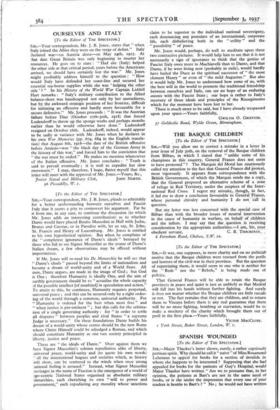OURSELVES AND ITALY
[To the Editor of THE SPECTATOR.]
SIR,—Your correspondent, Mr. J. B. Jones, states that " when Italy joined the Allies they were on the verge of defeat." Italy declared war—on Austria alone—on May z4th, 1915. At that date Great Britain was only beginning to muster her resources. He goes on to state : " Had she (Italy) helped the other side at that critical.period, years before the Americans arrived, we should have certainly lost the war." Mr. Jones might profitably address himself to the question : " How would Italy have defended her coast-line and secured her essential sea-borne supplies while she was ' helping the other side ' ? " In his History of the World War Captain Liddell Hart remarks : " Italy's military contribution to 'the Allied balance-sheet was handicapped not only, by her unreadiness, but by the awkward strategic position of her frontier, difficult for initiating an offensive and hardly more favourable for a secure defensive." Mr. Jones proceeds : " It was the Austrian failure before Diaz (October 27th-3oth, 1918) that forced Ludendorff to throw up the sponge weeks and perhaps months earlier than he would otherwise have done." Ludendorff resigned on October 26th. Ludendorff, indeed, would appear to be sadly at variance with Mr. Jones when he declares in his own War Memories (pp. 679, 684 in the English transla- tion) that August 8th, 1918—the date of the British offensive before Amiens—was " the black day of the German Army in the history of this war," and forced him to the conviction that " the war must be ended." He makes no mention whatsoever of the Italian offensive. Mr. Jones concludes : " Truth is said to prevail eventually ; it is well to expedite her slow movement." I may, therefore, I hope, flatter myself that this letter will meet with the approval of Mr. Jones.—Yours, &c.,










































 Previous page
Previous page